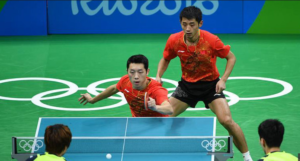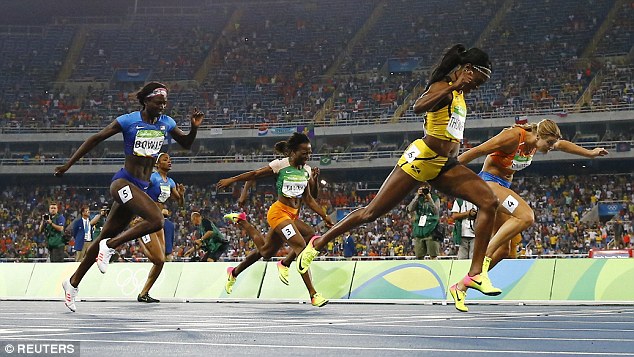Table Tennis
Today was the final day of competition in this sport, which China dominates more than any country dominates any sport. Indeed, this headline in today’s New York Times speaks volumes about its dominance:
At Least 44 Table Tennis Players in Rio Are Chinese-Born. Six Play for China
To make it a little more relatable, this is rather like a 100m sprint with 8 runners who are all Jamaican-born, but only 2 of whom are running for Jamaica. I commented on Day 9 about this rent-an-Olympian phenomenon, in which natives not good enough to make their home team become athletic mercenaries for other teams.
No surprise then that China won gold in every event coming into this final one, the Men’s Team Match for gold against Japan.
- China won … again.
This Chinese domination might explain why Table Tennis got so little prime-time coverage on American TV during these Games.
I submit, however, that more people worldwide would do well to play this sport. In fact, the only reason I’m bothering to comment on today’s event is to encourage you to give it a shot.
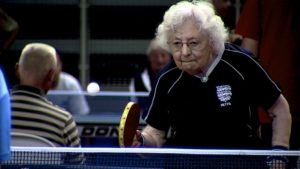 Table Tennis enables a unique combination of exercise and fun, irrespective of one’s age or level of fitness. The British documentary film Ping Pong dramatizes this to endearing and encouraging effect.
Table Tennis enables a unique combination of exercise and fun, irrespective of one’s age or level of fitness. The British documentary film Ping Pong dramatizes this to endearing and encouraging effect.
It features players from around the world competing in the over-80 division of the 2010 World Veterans Table Tennis Championships. Most notable among them is Dorothy DeLow of Australia, a 100-year-old legend who could still hold her own.
Closer to home, I applaud Will Shortz for doing so much over the years to popularize this sport here in the USA.
Five years ago, dipping into the small fortune that his crossword and Sudoku puzzles have brought him, the New York Times crossword editor Will Shortz bought an old ‘junk dealer’s warehouse,’ near his home in Pleasantville, New York, and — because puzzles aren’t his only obsession — turned fourteen thousand square feet of it into a world-class Ping-Pong facility.
In late October, Westchester Table Tennis Center hosted one of Shortz’s monthly club tournaments, which are the largest in the United States.
(The New Yorker, November 2, 2015)
I am proficient at Swimming and Ping Pong. And, trust me, Ping Pong not only provides the same kind of total-body workout, it’s also a lot more fun.
Track and Field
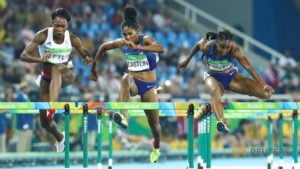 After failing thus far to win gold in any Track event, Team USA found some measure of redemption in Women’s 100m Hurdles, sweeping it for the first time in Olympic history.
After failing thus far to win gold in any Track event, Team USA found some measure of redemption in Women’s 100m Hurdles, sweeping it for the first time in Olympic history.
- Brianna Collins of the USA won gold in 12.48; Nia Ali of the USA, silver; and Kristi Castlin of the USA, bronze.
Chances are that, but for the doping controversy surrounding Russian athlete Darya Klishina, relatively few people would’ve been interested in the outcome of the Women’s Long Jump.
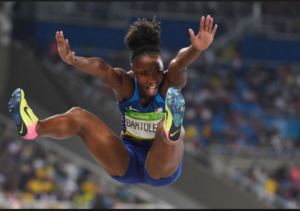 More to the point, given what I wrote in my Day 8 commentary, I would be remiss not to acknowledge how it finally played out today.
More to the point, given what I wrote in my Day 8 commentary, I would be remiss not to acknowledge how it finally played out today.
- Tianna Bartoletta of the USA won gold in 23’5″; Brittney Reese of the USA (the defending champion), silver; and Ivana Spanovic of Serbia, bronze. (Klishina placed 9th.)
That said, the event of the day was the Women’s 200m. As indicated in my Day 10 commentary, I had far less interest in this event after injury prevented Allyson Felix of the USA from qualifying. Given that, and the absence of any Bahamian, I really did not have a horse in this race … so to speak.
Frankly, the only point of interest for me was whether the white Dutchwoman, Dafne Schippers, would break the near monopoly blacks have had on gold medals in this event in recent history. The notable exceptions being at Munich 1972, Montreal 1976, and Moscow 1980, when doped-up East German women prevailed. Which of course compels one to wonder about the uncanny resemblance Schippers bears to those East Germans….
As it happened, she came as close to winning as any white girl has since Moscow.
- Elaine Thompson of Jamaica won gold in 21.78 (becoming the first woman to double in the 100m and 200m since Florence Griffith-Joyner at Seoul 1988); Dafne Schippers of the Netherlands, silver; and Tori Bowie of the USA, bronze.
But, to be fair to white sprinters, black ones from Africa have been no more successful. Indeed, it is a curious thing that blacks from Jamaica and the United States have been as dominant in Olympic sprint events as blacks from Kenya and Ethiopia have been in Olympic distance events.
MEDAL COUNT: USA – 93; China – 54; Great Britain – 50
Related commentaries:
Klishina long jump…
